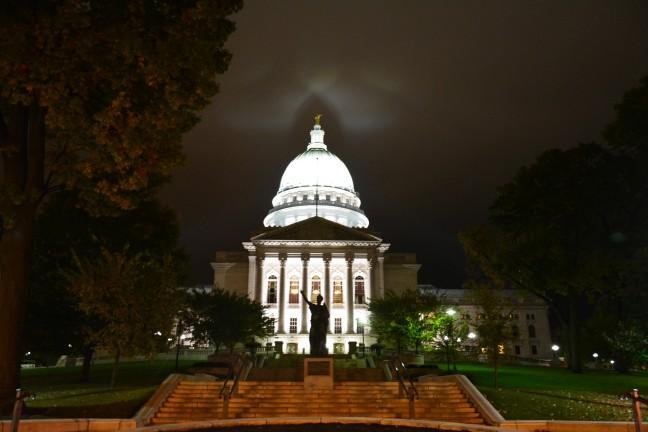When Masood Akhtar, the founder of We are Many — United Against Hate, first decided to give out microloans to furloughed federal workers, he had no idea how much support he would receive. But after fundraising $80,000, it is clear how eager people were to help.
After the federal government shut down Dec. 22, many federal workers were not paid and federally-funded agencies did not receive grants. The shutdown temporarily ended Jan. 25, but there is a chance it will shut down again this month.
During the shutdown, Akhtar saw similarities between the struggles of Madison’s furloughed federal workers and his own Muslim community.
“These people are just like our people, some of them are even protecting our lives, like the TSA at the airport,” Akhtar said. “They are saving our lives and yet these people are not paid.”
According to their website, We are Many — United Against Hate is a nonprofit dedicated to protecting all people from hate, bigotry and racism.
Though providing loans to furloughed federal employees is not a typical task of the nonprofit, Akhtar explained the loans are unique for other reasons. According to Akhtar, the microloans are interest-free and they add a “human element” to the loan-giving process.
Akhtar said that the “human element” is key because it promotes engagement across many groups. He explained that if the person seeking the loan lives in Wisconsin, he himself will drive to where they are and learn about the issues in that person’s community.
“My intent is if you continue on this path and you help somebody in need I am pretty confident that whenever there is a need in the future, those other people will come forward and help these communities because they were helped by somebody,” Akhtar said.
Akhtar said he plans to continue giving these microloans out because many workers are still struggling. He explained that some workers even went into credit card debt trying to stay afloat during the shutdown, and because of this he wants to continue the loans until federal workers are financially secure.
Jirs Meuris, assistant professor at the University of Wisconsin School of Business, stressed the importance of the loans. According to Meuris’ research, employees who are financially insecure tend to be less productive. This financial insecurity leads to anxiety, making employees unable to focus on work, he explained.
“These interest-free loans are trying to create these safety nets for these workers … providing these safety nets can reduce a lot of the psychological strain that comes along with financial insecurity,” Meuris said.
Meuris also noted that uncertainty contributes to psychological strain, and explained that because workers did not know when the shutdown would end, their anxiety was likely made worse.
Robert Andresen, director of Research Financial Services at UW, said this same uncertainty has impacted other research being done at the university. One of UW’s major funders and a federal agency, the National Science Foundation, was shut down causing proposals for new projects to pile up. Going through the proposals could take weeks, delaying research even more, Andresen said.
“What our faculty were hoping to be able to do this year and next year they might not be able to do until next year and the year after that,” Andresen said. “When you’re dealing with science, that’s disappointing.”
Andresen said most of UW’s research is funded by the federal government through grants. These grants are given as reimbursements for costs incurred though, so during the shutdown, UW had to monitor its research spending and use funding reserves to cover costs, Andresen explained. If the government does shut down again Feb. 15, things could get even tighter for UW’s research as much of their funding reserves have been exhausted, he said.
Jonathan Sleeman of the U.S. Geological Survey explained the concerns research facilities had during the shutdown. The USGS is also very reliant on federal funding, and, while they were able to protect all of their data, Sleeman estimates that it will take months to catch up on research, but their top focus is their employees.
“My concern is our staff and the morale … still, right now we’re trying to make sure everybody gets their back pay, that’s of equal concern to me, as our mission,” Sleeman said.
Meuris said some of this back pay may come too late. He said that throughout the shutdown, people had to do things like sell their cars and spend their savings to get by. These extreme acts will do longterm damage to their financial welfare, something that cannot necessarily be solved by back pay alone, he said.
To address this issue, Meuris suggested giving workers back pay with interest. He pointed out that there is a precedent for this as companies that receive federal funds get interest when payment is delayed. Meuris also said that stopping these shutdowns is important because eventually federal jobs will not be filled.
“If you’re having these shutdowns continuously then the private sector becomes a lot more attractive and so you’re going to have this brain drain from the federal government to other types of work,” Meuris said.
Meuris said there is even talk of outlawing shutdowns without pay. Until some of these changes are made, Akhtar said he will continue to give out microloans. Akhtar is not worried about running out of funds as he has actually received more donations than requests for loans.
With calls from Maryland to Florida, news of Akhtar’s microloans have spread fast, and he said he hopes that his message of problem-solving through community engagement does as well.
“We can solve this problem and then move forward and build a community as a model in Wisconsin,” Akhtar said. “My intent is really that we are building a model of an inclusive community that I am hoping one day will become a national model.”


